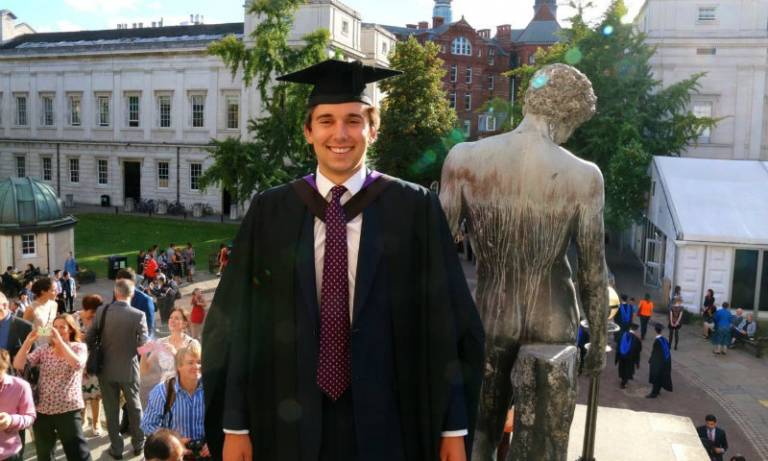
Personal Tutor Review publishes conclusions and recommendations
 Close
Close

13 December 2016
Toby Skailes chose the social enterprise pathway, mixing with people from across the university for ‘two of the best weeks in my years at UCL’.

UCL alumnus Toby Skailes is an Associate in Deloitte’s Private Markets Audit Practice. He graduated in 2016 with a Human Sciences BSc. At the end of his second year at UCL he took part in the Global Citizenship Programme, a UCL summer school where current students get together to explore big challenges and develop approaches and skills to tackle them. Toby credits the Programme with getting him onto his graduate training scheme. Here, he describes the experience:
'I took part in the Enterprise Pathway strand of the programme, where we worked in teams to create a socially responsible enterprise with a novel approach to address one of five global social problems – obesity, access to clean water, global warming, aging population or youth unemployment.
I chose the Enterprise Pathway because I knew I wanted to learn about business and I’m interested in how business can be used for social good. I can genuinely say my two weeks on the programme were two of the best weeks in my three years at UCL.
“Mornings were taken up with workshops where entrepreneurs and mentors spoke to us about the fundamentals of setting up a business, sharing their real world experience of the social enterprise field. In the afternoons we worked in teams on the social enterprise we were tasked with creating. Doing a lot of social science modules as part of my degree, the majority of my work was essays so it was refreshing to do some more practical work and put theory from the workshops into practice.
I didn’t know anyone else in my team, so getting to mix with people from all over UCL was a big plus. Between the eight of us we were reading for seven different degrees, from Aquatic Science to History and held five different passports! Having such a diverse team with such different mind-sets led to some initial clashes of ideas, but in the end it definitely led to the best and most creative outcomes.
We chose to work on improving access to clean water in India, and developed a social enterprise we called AquaRoot. The specific problem is that while there are wells to get water to the surface, the water they bring up is contaminated with arsenic from rocks, something the World Health Organisation refers to as ‘the greatest mass poisoning in history’. So basically the water needs purifying. To cut a long story short our solution to the problem came when our research revealed a very simple technology with a (complicated name!) called phytoremediation filtration. Ferns that occur naturally in India have the capability to absorb arsenic and store it in their leaves, so by growing them in troughs of contaminated water they leave the water safe to drink. Furthermore, by then processing these leaves it is possible to extract pure arsenic, a crucial component in making computer chips.
The business model was that AquaRoot would sell the arsenic to India’s fast growing technology sector. Revenue generated would then be split between the people who cultivated the ferns and AquaRoot. Those previously at risk of drinking contaminated water therefore would have a low cost system for producing safe water and supplementary income to make it sustainable.
The social enterprises other teams created ranged from exercise bikes which hooked up to smoothie machines to tackle obesity in Brixton; to buying old buses and converting them into mobile start-up hubs to solve youth unemployment in Colombia. At the end of the two weeks the final day was spent Dragons’ Den style presenting the businesses to a panel of judges with backgrounds in entrepreneurship and a winning team was chosen.
I think the Global Citizenship programme helped me in two ways. Firstly, in getting onto a graduate training scheme. I had an hour long interview where I was asked to give an example of one project I had taken part in and I was grilled on it for the whole time. I used Global Citizenship and it made me realise how many transferrable skills I had gained - writing a business plan, team work and presenting, to name a few.
The second, and most important, thing I took away from the programme is that there is hope – there are ways to tackle societies’ problems and the Global Citizenship programme shows that by putting our heads together and thinking across disciplines, we can come up with practical solutions to the global challenges we face.’